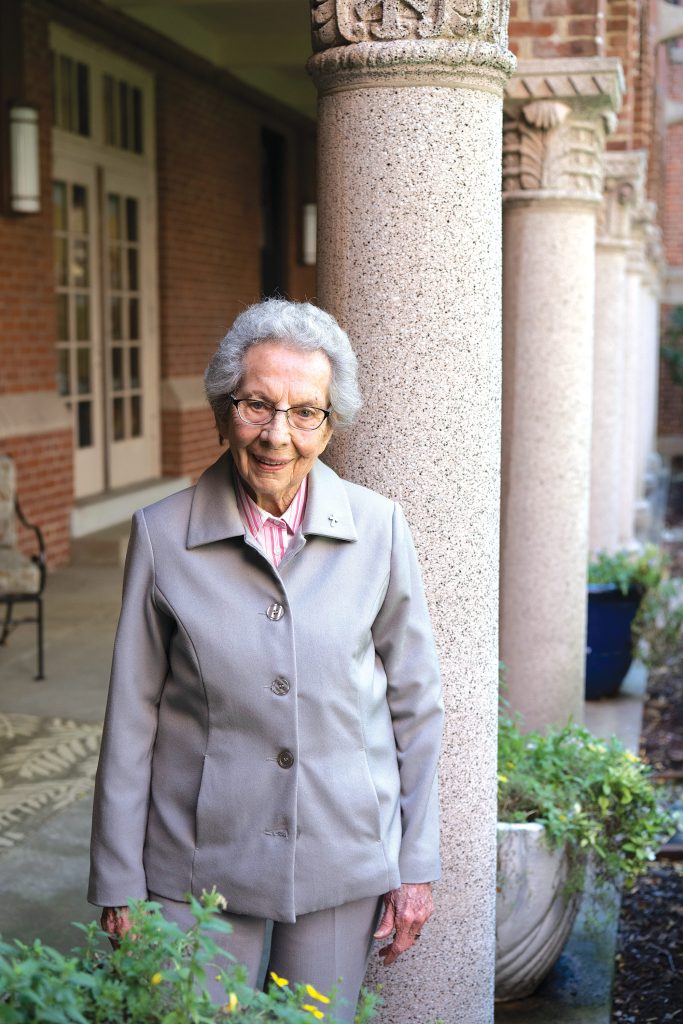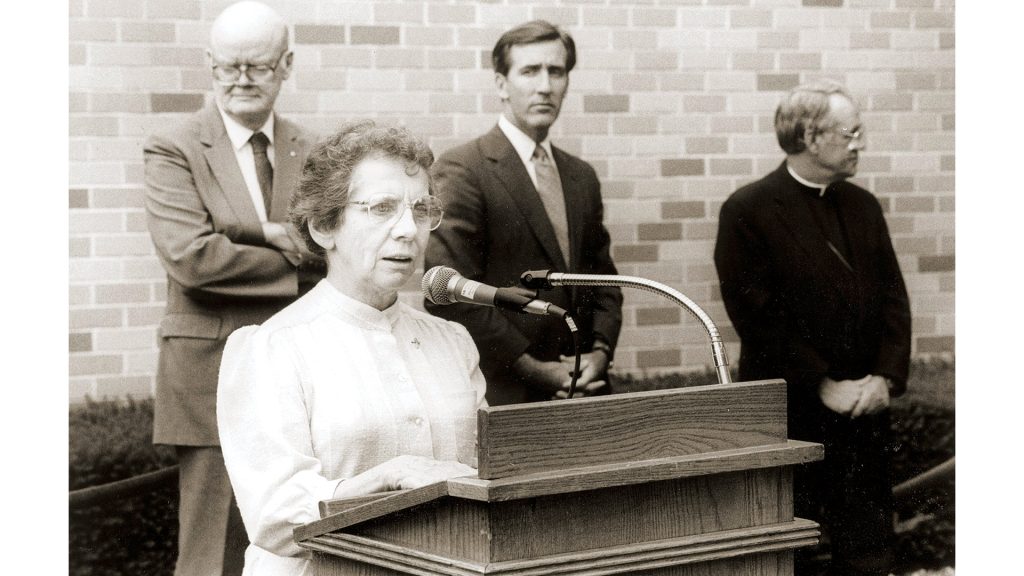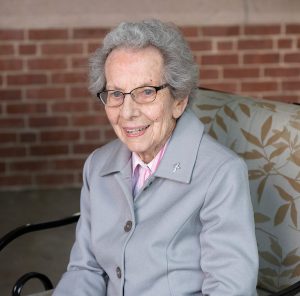
Sister Mary Caritas, SP
For Nearly a Century, She’s Been Fighting for Good Causes

Sister Mary Caritas, SP has always remembered something that one of the doctors, a cardiologist, at Mercy Hospital told her while she was doing duty on one of the floors as a nursing student more than 75 years ago now.
“He told me, ‘little nurse … when we’re born, we’re born with a certain amount of energy; at the rate you’re going, you’re going to be dead by 40.’”
Turns out, he was wrong. Big time. And an entire region can be very glad that he was.
Sister Caritas was obviously born with more energy to expend than the rest of us, and she’s still proving that at age 99. She’s spent her whole life proving it, in ways large and small, highly visible or seen by only a few.
Space does not permit us to get into all that Sister Caritas has done during her remarkable life and career, at least in any detail. Hitting the highlights, she has been a hospital administrator — she was president of Mercy Hospital for 16 years, and before that was administrator at St. Luke’s Hospital and associate director of Berkshire Medical Center. She’s also been very active with the Sisters of Providence and its broad mission, serving as president from 1960 to 1977, as vice president from 2009 to 2013 and from 2016 until today, and in other roles as well; she is now the oldest member of that order.
She has also been very active in healthcare, serving on the boards of the Sisters of Providence Health System, Trinity Health Of New England, Catholic Health East, the Massachusetts Hospital Assoc., the American Hospital Assoc., Partners for a Healthier Community, Cancer House of Hope, the New England Conference of the Catholic Health Assoc., and perhaps two dozen other local, state, regional, and national institutions and organizations.
And she’s been active in the community, serving in capacities ranging from corporator of the former Community Savings Bank to trustee of the board of the Massachusetts Easter Seals Society, to chairperson (quite famously, by the way) of the Task Force on Bondi’s Island in the mid-’90s.
But it’s not the lines on the résumé — no matter how many there are, and yes, there are a lot them — that explain why Sister Caritas is a Woman of Impact. It’s what you can read between those lines.
It’s the story of an extraordinary individual driven at a young age to learn, teach, serve the community and especially those who are less fortunate, and simply make this region, and the world, a better place.
She has, in fact, said ‘no’ to a few people who have asked her to take on an assignment because there are only so many hours in the day — she tried to turn down the Bondi’s Island Task Force, for example, but those asking wouldn’t take ‘no’ for an answer. But almost always, she said ‘yes.’
And she became known not merely for serving, but for fighting, doggedly, for what she thought was right and just and needed at the time, whether it was a cancer-treatment facility at Mercy Hospital, fairer Medicare reimbursement rates, or, yes, a solution to the odor problems at Bondi’s Island.

As one might expect with someone who started working professionally in the mid-’40s, talk of her accomplishments obviously involves the past tense. But she remains a Woman of Impact for the way she counsels, mentors, and inspires others, especially women, in leadership roles today. She didn’t officially coin the phrase ‘no margin, no mission,’ but many area nonprofit managers will attribute those words to her as they strive to live by them.
Meanwhile, her life and career has been marked by being thrust into a series of new and daunting challenges, many of which she considered herself quite unprepared for. She’s proven that, with hard work, energy, and a focus on the best outcome for all, one can thrive despite adversity.
“Every role I’ve had, despite the challenges, was the happiest time of my life,” she told BusinessWest, adding that she made the most of every situation and turned them all into invaluable learning experiences. “Every day is a present, and if I haven’t learned something new in a day, then it wasn’t a good day.”
Energy. Yes, Sister Caritas still has large amounts of that commodity. She doesn’t play golf as much as she used to, not because she has slowed down, but because most of those she played with over the years have slowed down. She drives, and she sets a good pace when walking the halls of Providence Place.
She doesn’t have the same level of energy she did 40 years ago or when she was a nursing student, but she’s still very much involved — and clearly a Woman of Impact.
Small Wonder
Those who know Sister Caritas, who came to be known as ‘little sister’ to some because of her small stature, would say it’s not what she does — whether it’s in healthcare, the community, or with the Sisters of Providence — that makes her a true leader, still, at age 99.
Rather, it’s how she goes about … well, whatever it is she is doing. One hears the word ‘determined’ early and quite often when people describe her, and that word fits. So does ‘relentless.’ And ‘unstoppable’ works as well.
Those adjectives certainly apply to her lengthy battle to win approval from the Massachusetts Department of Public Health for a cobalt unit for cancer treatment at Mercy Hospital. She first filed an application in 1978, and it was denied. Applications could only be filed biannually, so she tried again in 1980. And in 1982. And in 1984. And in 1986 … you get the picture.
“There was nothing wrong with the applications, it was just that the Department of Public Health deemed it was not needed,” she said. “But I thought otherwise.”
“He told me, ‘little nurse … when we’re born, we’re born with a certain amount of energy; at the rate you’re going, you’re going to be dead by 40.’”
So she kept on filing applications until finally, in 1993, after she had given notice to the board at Mercy that she would be retiring, the state said ‘yes.’
There are many examples of such determination and perseverance from her lengthy career. Before getting to some, for those who don’t know the Sister Caritas story — and most do — we’ll recap quickly.
Mary Geary was born in Springfield and attended schools in the city. Her parents thought it would be good for her to pursue a career as a secretary, and for a short while, she did, at Commerce High School.
“I was in the secretarial program, learning shorthand and all that … and I was flunking; I hated it every single minute of it,” she recalled, noting that her life changed when she met a girl training to become a nurse at Providence Hospital in Holyoke.
“That absolutely turned my life around,” she told BusinessWest. “I knew … I was so incredibly inspired that I went from Commerce over to Tech [Technical High School], took all my sciences, and eventually went to nursing school.”
Fast-forwarding through the next half-century or so, Geary joined the Sisters of Providence and was sent to St. Vincent’s Hospital in Worcester as a nurse. But upon making her final vows after her fifth year, in 1949, she was sent to Mercy Hospital in Springfield, a move she was thrilled with until she found out that, instead of nursing, she would focus on dietary services, a decision made by the reverend mother.
After receiving a master’s degree in nutrition education at Tufts University and undertaking a dietetic internship at the Francis Stern Food Clinic at the New England Medical Center in Boston, she was assigned to be administrative dietitian at Providence Hospital in Holyoke, an assignment she enjoyed for seven years.
She then got another call from the Mother House, this one to inform her that she was being named administrator at St. Luke’s Hospital.
When she replied that she didn’t know anything about hospital administration, her superior responded with a simple ‘you’ll learn,’ which she did.
After St. Luke’s and Pittsfield General merged in 1969 to become Berkshire Medical Center, Sister Caritas served briefly as associate director of that facility — briefly because she was chosen to lead the Sisters of Providence and take the title superior general, a title that intimidated her about as much as the long list of responsibilities that came with it.
“I was totally unprepared for this,” she said, adding that, as she did with other stops during her career, she learned by doing.
And that ‘doing’ included work to create a new Mercy Hospital, a facility that would replace a structure built by the Sisters of Providence in 1896; it opened its doors in 1974. Sister Caritas would be named president of the hospital three years later, and would serve in that role until 1993.
Highlights during her tenure, and there were many, include an in-hospital surgery center; an eye center; an intensivist program; one of the nation’s first hospitalist programs; creation of the Weldon Center for Rehabilitation, the Family Life Center, the Healthcare for the Homeless initiative; and much more.
Sister Act
As noted earlier, it’s not the lines on the résumé that explain why Sister Caritas is a Woman of Impact, but the determination she showed when there was a fight to be waged, whether it was for the cobalt unit, to solve the odor problems at Bondi’s Island, or to gain needed adjustment in the Medicaid Area Wage Index.
That last fight was one that took her from Springfield to Washington, D.C. with several stops in between. If there’s an episode from her career that best sums up her persistence — her willingness to fight for something important — it is this one. It’s a story she enjoys telling, and she did so again for BusinessWest.
“The change in the rate meant that Mercy Hospital was going to lose $6 million that year, and $6 million then is like $30 million now,” she said, noting that all the other community hospitals in the area, and there were many more at the time, were looking at similar losses. “So I became very involved because I was so upset with what they were doing.”
That is an understatement.
“Richie Neal was a very young congressman at the time,” she said, noting that he secured a revision in the rate on the House side of the budget. “I thought my friend Mr. Kennedy [U.S. Sen. Edward Kennedy] had put it in on the Senate side, it had gone to vote, and it was now in conference.

“We learned that it was in conference and that it had not made its way into the budget,” she went on. “So I was panicked; I called all the other hospital administrators and said, ‘we’ve got to go to Washington; I can’t afford to lose $6 million this year — Mercy will go out of business. They all they felt the same way, but none of them wanted to go to Washington, so I went on my own; I went for all of us.”
Here’s where an already revealing story becomes even more so. She first went to see Neal, who told her that a revision was, indeed, included in the House side of the budget. The problem, he said, was in the Senate.
“So I marched across the Capitol to the Senate side, and Kennedy wasn’t there,” she said. “They told me that he may not be back that day, and I told them, ‘you better plan on me staying here all night; I’m not leaving here. I’m a constituent, I have a right to see my senator, and I will not leave this office until I see him.
“They kept trying to placate me, offering me cookies and tea, and I just kept saying, ‘no, I’m not leaving until I see my senator,’” she went on. “I waited, and waited, and waited, until finally, about 4 in the afternoon, he shows up.
“He tells me it’s in conference, and I said, ‘I know; that’s why I’m here,’” she continued, adding an exclamation point through inflection on her voice. “He said, ‘who do you know on the conference committee?’ I poked him on the chest and said, ‘it’s not who I know, it’s who you know.’”
Sensing that the battle might be lost if she had to rely on the senator, Sister Caritas went to work. She went to the nearest pay phone (this is the early ’90s, remember) and instructed her administrative assistant to call the other area community hospital presidents and have them in her office the following morning. Before that, though, she called the Mercy Hospital print shop and had it print 6,000 postcards that would eventually be sent by area constituents to legislators imploring action on the Medicare issue.
While Kennedy would call Sister Caritas after the vote to revise the wage index a few days later, she believes it was those postcards that turned the tide. And those involved would say that it was Sister Caritas herself who really drove that outcome — again, just one of many examples of her fighting spirit.
Century Unlimited
The last page of Sister Caritas’s résumé has the single word ‘Honors’ at the top. And there is a long list that follows, including honorary degrees from several area colleges, a William Pynchon Award, a Paul Harris Fellowship from the Springfield Rotary Club, a Lifetime Achievement Award from the Girl Scouts of Pioneer Valley, and a Woman of Achievement Award from the YWCA — a few of them, in fact.
She’s also won several from BusinessWest and its sister publication, the Healthcare News, including Business Person of the Year in 1992, Difference Maker (awarded to the Sisters of Providence) in 2014, and Healthcare Hero (in the Lifetime Achievement category) in 2018.
And because of all that she did earn these honors, she now has one more line to add to that page: Woman of Impact.
George O’Brien can be reached at [email protected]





